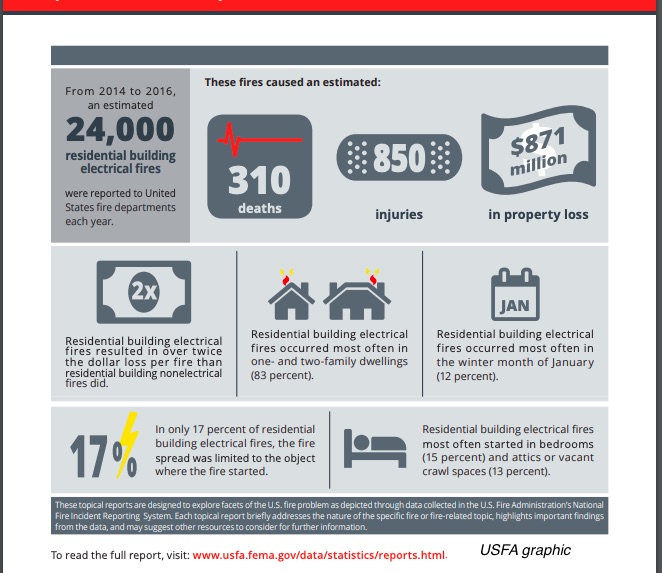The risk of electrical fire in residential settings increases during winter months, according to a recent study by the U.S. Fire Administration. Thirty-two percent of the 24,000 electrical fires that occurred during that time period took place during the months of December, January and February. With 12 percent of the total, January was the month during which these fires most often occurred, followed by December and February that accounted for 10 percent each.
The higher incidence of these fires during colder months likely corresponds to the increase in lighting, heating and appliance use that stems from an increase in indoor activities, the study’s authors said. The month with the lowest incidence of electrical fires is September, with 6 percent.
In total, these fires resulted in 850 injuries and 310 deaths. And most of them, 83 percent, occurred in single-family or two-family dwellings. The bedroom and the attic were the most common areas of origin with 15 percent starting in a bedroom and 13 percent starting in an attic or crawlspace. The fires occurred most frequently in the late-afternoon and early-evening hours. Electrical failure or malfunction was the reason most often cited as the source of the fire. Only about half of the homes where these fires took place had smoke alarms and fewer than 3 percent had sprinkler systems.
Fire Safety Tips
To reduce the risk of electrical fire, the U.S. Fire Administration recommends the following tips:
- Major appliances, such as refrigerators, stoves, washers and dryers and smaller appliances should be plugged directly into a wall outlet. Using an extension cord with a major appliance could start a fire.
- Unplug small appliances when they are not in use.
- Keep lamps and light fixtures away from flammable objects.
- Use light bulbs with the recommended wattage for lamps and light fixtures.
- Never use damaged electrical cords or try to repair them.
- Don’t overload wall sockets.
- Use extension cords on a temporary basis only.
- Don’t put cords under a rug or in any other sport where they could be pinched.

